☆ PuniPuni Youtube ☆
Japanese Grammar: Japanese Adjectives – 形容詞
Today we learned about the two types of Japanese adjectives. Adjectives are an important part of learning Japanese because they are used to describe things!
These notes will explain more about today’s grammar and give extra examples of how to use Japanese adjectives.
………………………………………………………………………………..
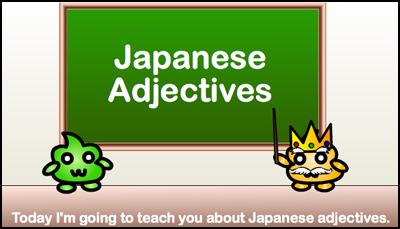
★ Today we learned that there are two types of Japanese adjectives: い-adjectives & な-adjectives
………………………………………………………………………………..
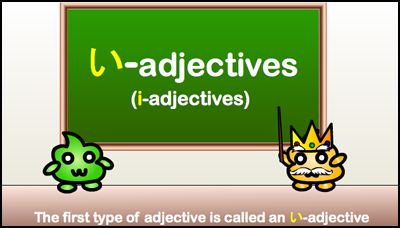
★ The first type of Japanese adjective that we learned is the い-adjective.
★ It is called an い-adjective because it always ends in い (i) before the noun that it is modifying.
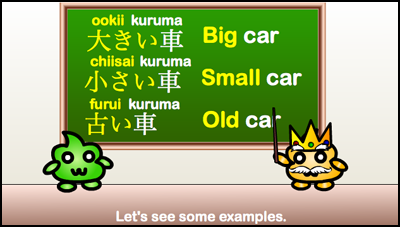
………………………………………………………………………………..
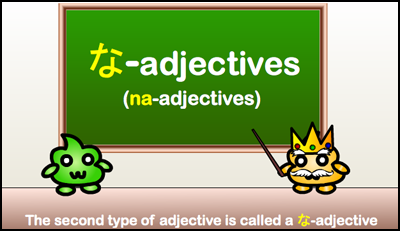
★ The second type of Japanese adjectives that we learned is the な-adjective.
★ It is called a な-adjective because it takes な (na) before the noun that it modifies.
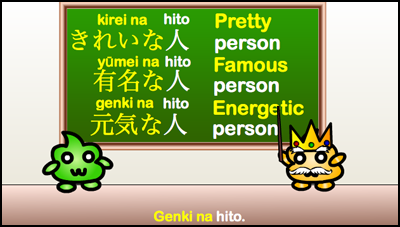
………………………………………………………………………………..
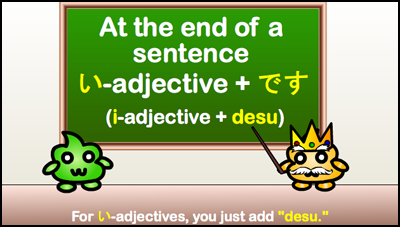
★ When you use い-adjectives at the end of a sentence, just add です (desu).
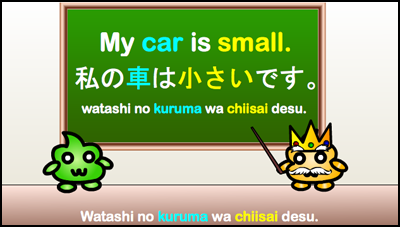
………………………………………………………………………………..
Example:
私の車は大きいです。
Watashi no kuruma wa ookii desu.
My car is big.
………………………………………………………………………………..
Example:
あの車は速いです。
Ano kuruma wa hayai desu.
That car is fast.
………………………………………………………………………………..
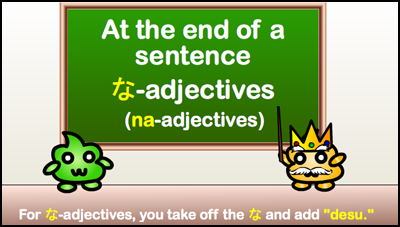
★ When you use な-adjectives at the end of a sentence, you take off the な and add です (desu).
………………………………………………………………………………..
な-Adjective before the noun:
有名な学校です。
Yūmei na gakkō desu.
It is a famous school.
………………………………………………………………………………..
な-Adjective after the noun:
この学校は有名です。
Kono gakkō wa yūmei desu.
This school is famous.
………………………………………………………………………………..
About Adjective Conjugations:
★ Unlike English adjectives, Japanese adjectives need to be conjugated like verbs.
★ い-adjectives and な-adjectives are conjugated differently, so it is important to know which adjectives are い-adjectives and which are な-adjectives.
………………………………………………………………………………..
Past tense of い-adjectives:
★ To make the past tense of い-adjectives just take off the い (i) and add かった (katta). Add です (desu) to the end in formal speech.
あつい (atsui) hot
⬇
あつかった (atsukatta) was hot
………………………………………………………………………………..
Example Present Tense:
今日はあついですね。
Kyō wa atsui desu ne.
It is hot today.
Example Past Tense:
昨日はあつかったですね。
Kinō wa atsukatta desu ne.
It was hot yesterday.
………………………………………………………………………………..
Negative form of い-adjectives:
★ To make the negative form of い-adjectives just take off the い (i) and add くない (kunai). Add です (desu) to the end in formal speech.
さむい (samui) cold
⬇
さむくない (samukunai) not cold
………………………………………………………………………………..
Example Affirmative:
今日はさむいですね。
Kyō wa samui desu ne.
It is cold today.
Example Negative:
今日はさむくないですね。
Kyō wa samukunai desu ne.
It is not cold today.
………………………………………………………………………………..
Negative Past tense of い-adjectives:
★ To make the negative past tense of い-adjectives from the negative present tense, just take off い (i) and add かった (katta). Add です (desu) to the end in formal speech.
楽しくない (tanoshikunai) not fun
⬇
楽しくなかった (tanoshikunakatta) was not fun
………………………………………………………………………………..
Negative Present Example:
仕事は楽しくないです。
Shigoto wa tanoshikunai desu.
My job is not fun.
Negative Past Example:
パーティーは楽しくなかったです。
Pātī wa tanoshikunakatta desu.
The party was not fun.
………………………………………………………………………………..
Past Tense of な-adjectives:
★ To make the past tense of な-adjectives just change です (desu) to でした (deshita) for formal speech or だ (da) to だった (datta) for casual speech.
大変です (taihen desu) is tough
⬇
大変でした (taihen deshita) was tough
★ Nouns do the same thing as な-adjectives:
先生です (sensei desu) is a teacher
⬇
先生でした (sensei deshita) was a teacher
………………………………………………………………………………..
Present Tense Example:
宿題がたくさんあって、大変です。
Shukudai ga takusan atte, taihen desu.
There is a lot of homework so it is tough.
Past Tense Example:
宿題がたくさんあって、大変でした。
Skukudai ga takusan atte, taihen deshita.
There was a lot of homwork so it was tough.
………………………………………………………………………………..
Negative form of な-adjectives:
★ To make the negative form of な-adjectives just add じゃない (ja nai). Add です (desu) to the end in formal speech.
元気 (genki) energetic
⬇
元気じゃない (genki ja nai) not energetic
★ Nouns do the same thing as な-adjectives:
先生 (sensei) a teacher
⬇
先生じゃない (sensei ja nai) not a teacher
………………………………………………………………………………..
Affirmative Example:
私は元気です。
Watashi wa genki desu.
I am energetic.
Negative Example:
私は元気じゃないです。
Watashi wa genki ja nai desu.
I am not energetic.
………………………………………………………………………………..
Negative Past tense of な-adjectives:
★ To make the negative past tense of な-adjectives from the negative present tense just take off the い (i) and add かった (katta) similar to what we did for い-adjectives.
簡単じゃない (kantan ja nai) is not easy
⬇
簡単じゃなかった (kantan ja nakatta) was not easy
★ Nouns do the same thing as な-adjectives:
先生じゃない (sensei ja nai) is not a teacher
⬇
先生じゃなかった (sensei ja nakatta) was not a teacher
………………………………………………………………………………..
Negative Present Example:
簡単じゃないです。
Kantan ja nai desu.
It is not easy.
Negative Past Example:
簡単じゃなかったです。
Kantan ja nakatta desu.
It was not easy.
………………………………………………………………………………..
Click here for more い-adjectives
Extra な-Adjective List:
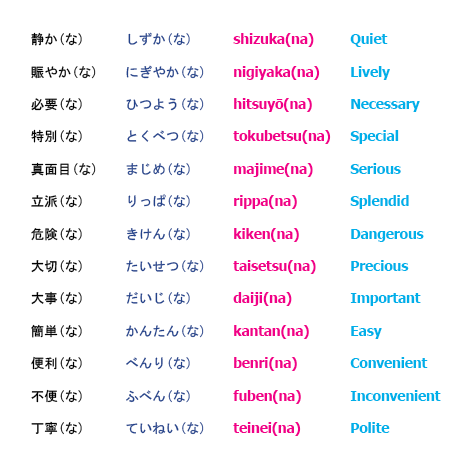
……………………………………………………………………………….
Conclusion:
We learned a lot about Japanese adjectives today! I know it is difficult to remember all of the rules of conjugations, but it will become clearer the more you hear it and use it (◕ω◕)♪
If you have any questions or concerns, please leave a comment below or send us an email♥
If you want to learn more about Japanese adjectives, you might be interested in this book! It includes a list of common adjectives and adverbs and explains in detail about how to use them in a sentence!
……………………………………………………………………………….
Do you want a Japanese tutor?
Take Japanese Skype Lessons with Professional Japanese Teachers on kakehashijapan.com!
………………………………………………………………………………..
………………………………………………………………………………..





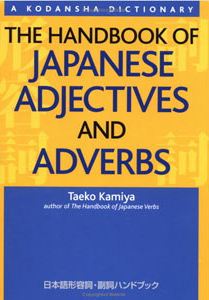




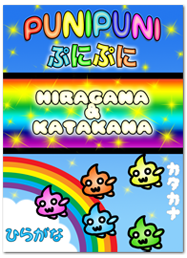
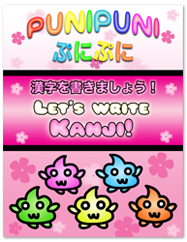


17 comments
So Watashi no kuruma wa chiisai katta desu will mean MY car was small?
Comment by Pluto on 08/03/2013 at 8:40 amAnd the different particles are getting confusing ;-;
My question is な-adjectives in the past tense you said “To make the past tense of な-adjectives just change です (desu) to でした (deshita) for formal speech or だ (da) to だった (datta) for casual speech.”, but where is the だ from in informal speech? and I have heard that there is specific placement of adjectives in the forms other than their present affirmative tense, but I have yet to hear your group state anything about that so is it true if so can you clarify it?
Comment by James on 02/16/2014 at 10:17 pmだ is the plain form (casual form) of the copula です. I am not sure I understand your second question. Tense doesn’t have any thing to do with word order. Could you please clarify your question(◕ω◕)?
Comment by PuniPuni on 02/19/2014 at 2:13 amHow do you know if an adjective is a na-adj or a n i-adj?
Comment by Eru on 03/29/2014 at 11:45 pmIs there a way to know or do you just have to know it?
There are some guidelines that help in some situations but there is no hard rule. For the most part, you will have to just learn them as you go.
1. If it ends in anything other than an ‘i’ then it is a na-adjective (e.g. kantan, rippa)
2. If there are 2 i’s, it is an i-adjective (e.g. tanoshii, ureshii)
3. If it ends in ‘ei’ it is probably a na-adjective (e.g. kirei, yuumei)
4. If a consonant comes before the final ‘i’ then it is a na-adjective (e.g. genki, benri)
5. If it ends in vowel + i (except for ‘ei’) it is PROBABLY an i-adjective, but there are exceptions.
Hope that helps! (◕ω<)☆
Comment by PuniPuni on 04/03/2014 at 10:23 am早い質問お願いします! ^^
Instead of じゃない / Ja nai, is it also appropriate to use ではありません / dewa arimasen?
For example, あの人は先生ではありません。 / That person is not a teacher.
どうもありがとうございます!
Comment by リズキ on 05/16/2014 at 11:42 pmYes, that’s right! Either is okay. (◕ω<)♡
Comment by PuniPuni on 05/23/2014 at 8:21 pmWow. arigatou ne! I have a test coming up this weekend and this was driving me crazy! Gotta practice now >.<
Comment by Silvio Carrera on 05/27/2014 at 5:47 pmKonnichiwa Puni puni! – I’m sorry if these are silly or obvious questions but I’m new to learning Japanese. My question is When you Add です (desu) to end in formal speech who are you supposed to use formal speech with? Is it for talking to strangers, doctors and other professionals like teachers only? And do you use だ (da) to end in casual speech for family, friends and neighbours? Also I’m not sure what です (desu) and だ (da) really mean could you explain please? Also what does ですね (desu ne) mean when you use it at the end of a sentence? ありがとうございます
Comment by Amy on 06/09/2014 at 7:51 pmKonnichiwa Puni Puni! Does.. watashii wa genki jai nai deshta mean I was not energetic? or is it watashii wa genki ja nakatta desu I am getting confused with all these new grammar. Also can you only say 楽しくなかった (tanoshikunakatta) which means was not fun. Would it be incorrect for me to say it the other way and say… tanoshikattakunai? for was not fun or is that completely wrong and you can only say.. tanoshikunakatta? ありがとうございます!
Comment by Amy on 06/09/2014 at 8:53 pmDon’t worry! Take it a step at a time and try not to remember too many different grammar points in one day. You will overwhelm your brain. (>ω<;) You can only say 楽しくなかった (tanoshikunakatta). You cannot say tanoshikattakunai.
Comment by PuniPuni on 06/21/2014 at 6:23 amOn the last given example of the negative past tense of な-adjectives, it says to say “It was not easy” you say “Kantan ja nakatta desu”, but shouldn’t you say “Kantan ja nakatta deshita” because of the past tense? Why would you not use “deshita” to signify past tense?
Comment by Dane on 07/22/2014 at 10:26 pmGood question! “Deshita” is only used for past affirmative tense. For a past negative sentence, you use “~ja nakatta (desu).” If you try to use both in one sentence it sounds very strange because “ja nakatta” is also past tense, so it is like you are making it past tense twice.
Comment by PuniPuni on 08/01/2014 at 7:48 amにほんごはかんたんじゃないです!
Comment by laura on 08/13/2014 at 2:52 pmこんにちわぷにぷに!
Comment by Mika on 09/18/2014 at 2:17 amJust a question about な-adjectives:
We have seen some examples with those adjectives at the end of the sentences,without using “な”, is it the same thing using な-adj+noun+(verb) ? Example : きれいな花じゃなかったです.
ごめんなさい!!! フランス人です!
I am not sure I understand your question, but I will do my best to answer. When using な-adjectives directly before a noun (to describe a noun) you must use the な ending. When using な-adjectives at the end of a sentence or not directly before a noun, you do not need to use な.
きれいな花じゃなかったです。 (It wasn’t a pretty flower.)
その花はきれいじゃなかったです。 (The flower wasn’t pretty.)
I hope that helps! Let me know if you still have questions!
Comment by PuniPuni on 09/18/2014 at 5:50 amありがとうごさいます !
Comment by Mika on 09/18/2014 at 2:19 amThanks for your answer! ^^